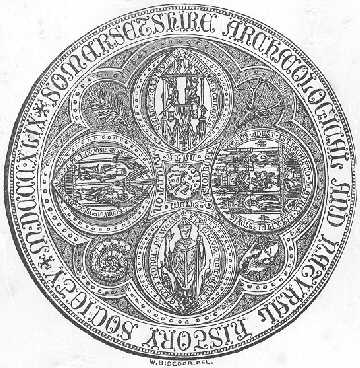Transcribed from the 1873 Longmans, Green, Reader & Dyeredition ,
a
GLOSSARY
of
PROVINCIAL WORDS & PHRASES
in use in
SOMERSETSHIRE.
by
WADHAM PIGOTT WILLIAMS, M.A.,
VICAR OF BISHOP’S HULL,
and thelate
WILLIAM ARTHUR JONES, M.A., F.G.S.
with
AN INTRODUCTION
By R. C. A. PRIOR, M.D.
LONDON: LONGMANS, GREEN, READER,& DYER.
TAUNTON: F. MAY, HIGH STREET.
1873.
p. iiiPREFACE
It is now nearly six years ago that the Committee of theSomersetshire Archæological Society asked me to compile aGlossary of the Dialect or archaic language of the County, andput into my hands a valuable collection of words by the late Mr.Edward Norris, surgeon, of South Petherton. I havecompleted this task to the best of my ability, with the kindco-operation of our late excellent Secretary, Wm. Arthur Jones; and the result is beforethe public. We freely made use of Norris, Jennings,Halliwell, or any other collector of words that we could find,omitting mere peculiarities of pronunciation, and I venture tohope it will prove that we have not overlooked much that is leftof that interesting old language, which those great innovators,the Printing Press, the Railroad, and the Schoolmaster, are fastdriving out of the country.
WADHAM PIGOTT WILLIAMS.
Bishop’s Hull, Taunton,
7th September, 1873.
p.vINTRODUCTION.
The following paper from the pen of Dr. Prior was read at aConversazione of the Society at Taunton, in the winter of 1871,and as it treats the subject from a more general point of viewthan is usually taken of it, we print it with his permission asan introduction to our vocabulary:—
On the Somerset Dialects.
The two gentlemen who have undertaken to compile a glossary ofthe Somerset dialect, the Rev. W. P. Williams and Mr. W. A.Jones, have done me the honour to lend me the manuscript of theirwork; and the following remarks which have occurred to me uponthe perusal of it I venture to lay before the Society, with thehope that they may be suggestive of further enquiry.
Some years ago, while on a visit at Mr. Capel’s, atBulland Lodge, near Wiveliscombe, I was struck with the noblecountenance of an old man who was working upon the road. Mr. Capel told me that it was not unusual to find among thepeople of those hills a very refined cast of features andextremely beautiful children, and expressed a belief that theywere the descendants of the ancient inhabitants of the country,who had been dispossessed of their land in more fertile districtsby conquerors of coarser breed. A study of the two dialectsspoken in the county (for two there certainly are) tend, I think,to corroborate the truth of this opinion.
It will be urged that during the many centuries that haveelapsed since the West Saxons took possession of this part ofEngland the inhabitants must have been so mixed up together thatall distinctive marks of race must long since have been
